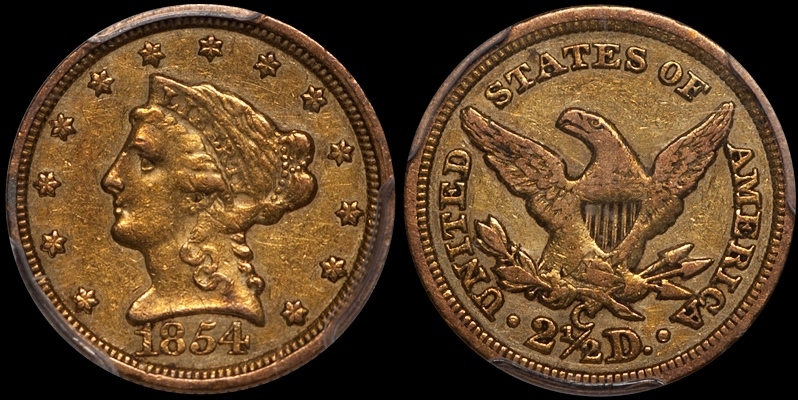1854-C $2.50 XF40 认证号25083982, PCGS号7770
拥有者评论
CAC DWN
专家评论
Doug Winter
After a one-year hiatus, production of quarter eagles at the Charlotte Mint resumed in 1854. Only 7,295 examples were produced, giving this date the fifth lowest mintage figure of any quarter eagle from this mint.Most often seen in the VF and EF range, the low mintage 1854-C quarter eagle is a scarce date in all grades. It is scarce in the lower AU grades and rare in properly graded AU55 to AU58. It is very rare in Uncirculated with approximately a half dozen or so known that qualify by today’s standards.
STRIKE: The 1854-C quarter eagle is generally not a well struck issue. Its quality of strike is fairly similar to that seen in the 1852-C. The central obverse is nearly always weakly detailed. The hair above and behind the ear is weak as are the curls above the eye. The top of Liberty’s head is mostly sharp, but on a number of pieces it shows considerable weakness. The stars are typically flat at the center and lack much detail on the radial lines. The reverse usually shows weakness on the right leg of the eagle, both claws and the lower portion of the neck. The outline of the shield at the right is weak as well. The date typically shows light strike doubling as do some of the stars.
SURFACES: There are very few examples known that do not show extensively abraded surfaces. In addition, a number were struck on poorly prepared planchets. Mint-made roughness is sometimes present around the date and many of the stars at the left. On the reverse there are clashmarks surrounding the eagle, as seen on the 1852-C quarter eagle. A number of 1854-C quarter eagles have an area of what appears to be extra metal at approximately 11:00 on the obverse rim. This is sometimes mistaken for damage but it is mint-made. On coins encased in third-party grading service holders, this may be hard to see.
LUSTER: The luster is grainy in texture and non-reflective. The overall quality is not very good. This is further exacerbated by the fact that most have been cleaned and the luster has been disturbed.
COLORATION: The few surviving pieces that show natural coloration show a medium to deep green-gold hue. Most 1854-C quarter eagles have been cleaned or dipped and, as a result, they have a bright, unnatural appearance.
EYE APPEAL: The typical 1854-C has poor overall eye appeal. This is due to weak strike, poor luster and a host of small mint-made planchet problems. A few attractive, higher grade pieces are known and these command strong premiums among knowledgeable specialists.
DIE CHARACTERISTICS: There is a strong die scratch which runs from the fraction bar down to the rim on the reverse. All known examples have a small mint-made depression to the right of the eagle’s neck.
DIE VARIETIES: A single variety is known.
Variety1 (formerly Variety 15-1): The 1 in the date is joined to the bust and it is very close to the denticles. The 4 is a little closer to the bust. The reverse is the same as described for the 1852-C.
David Akers (1975/88)
Always weaklty struck, particularly on the eagle on the reverse. Most specimens have a partial wire rim. (See comments on the 1852-C). The 1854-C is a very rare date in all grades and is particularly difficult to obtain in full mint state. The piece that appeared in Lester Merkin's April 1970 sale was quite possibly the finest known.PCGS #
7770
设计师
Christian Gobrecht
边缘
Reeded
直径
18.00 毫米
重量
4.18 克
铸币数量
7295
金属成分
90% Gold, 10% Copper
更高评级数量
78
评级较低的钱币数量
16
地区
The United States of America
价格指南
PCGS 数量报告
拍卖 - PCGS 评级的
拍卖 - NGC 评级的
稀有性和存量估计 了解更多
| 所有评级 | 115 |
| 60或以上 | 5 |
| 65或以上 | 0 |
| 所有评级 | R-7.8 |
| 60或以上 | R-9.7 |
| 65或以上 | R-10.1 |
| 所有评级 | 43 / 147 TIE |
| 60或以上 | 27 / 147 TIE |
| 65或以上 | 1 / 147 |
| 所有评级 | 43 / 147 TIE |
| 60或以上 | 27 / 147 TIE |
| 65或以上 | 1 / 147 |
























